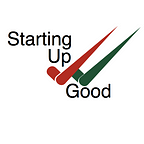Impact Investing & COVID-19: Curated Resource List Part 3
Written by Connette Blake
As part of our continuing coverage, StartingUpGood is scanning the web to gauge how impact investors are responding to the COVID-19 pandemic. This is our third installment of curated resources. See our previous articles here and here.
Are you finding these resources informative and helpful to your investment planning? Tweet us to let us know.
U.N. Secretary General Antonio Guterres, March 19, 2020:
We have a responsibility to “recover better.”
While not underestimating the urgent and overwhelming needs that so many people and businesses are facing right now, impact investors continue to keep an eye on the future and how their actions might shape it for the better. Marisa Drew, CEO of Impact Advisory and Finance Department at Credit Suisse, writes:
Perhaps what this is highlighting is a reflective awakening to the notion that the social and environmentally targeted themes underpinning impact investments are ultimately fundamental to a well-functioning, prosperous global economy. I hope that a positive longer-term enduring implication of the crisis will be that we have significantly accelerated the amount of capital directed toward creating positive change while demonstrating for many more private investors the compelling investment case for impact.
Capital is already moving to support this approach. On April 15th BlackRock announced the launch of an actively managed mutual fund for European Investors. The BlackRock Global Impact Fund will take long-term positions in companies tackling global challenges like the coronavirus, climate change and affordable housing.
It appears markets are moving to impact more quickly across the pond. Here are more examples of how European policy makers and companies are pursuing a “strategy of fueling the COVID-19 recovery with renewable energy.”
As Mary Mazzoni reports in TripplePundit:
Large financial institutions including the World Bank have similarly advocated for climate finance and other forms of green stimulus as part of COVID-19 recovery. Last week, a French member of the European Parliament followed suit, launching the European Alliance for Green Recovery and calling for climate change to be central in post-COVID-19 plans. The CEOs from 37 major European businesses, as well as heads of state from across the bloc, have since signed on. Both China and South Korea have also noted capital allocation for sustainable infrastructure as part of their recovery plans.
Here in the States, the Sorenson Impact Foundation and Village Capital have created the COVID-19 Response Pipeline. While some investors are pulling back during the economic downturn, many impact investors are “actively looking to provide capital and other forms of support to entrepreneurs addressing the global health and economic crisis tied to the COVID-19 pandemic.”
Through the Abaca platform, entrepreneurs providing COVID-19 solutions can apply for funding and investors can find opportunities to finance them.
Community Development Finance Institutions, or CDFIs, continue to play an important role as “economic first responders” by “creating emergency loan funds for small businesses, restructuring loans, suspending interest payments, and working directly with their borrowers to see them through these difficult times.”
Advisory firm Aeris is offering free access to its Performance Maps subscription service as a way of encouraging new investors to support the work of CDFIs with capital allocations.
Similarly, Calvert Impact Capital is highlighting the COVID-19 resources from some of its small business and CDFI partners in this updated blog post.
Donor Advised Funds, or DAFs, are getting more attention as an immediate source of large amounts of capital to address the COVID-19 response both in the US and abroad. ImpactAssets recently launched its COVID Response Fund for “impact investors and philanthropists to support those in need and to create a more resilient future… Donations will be allocated to beneficiaries as forgivable loans, low-interest loans, project-based donations and other impact investing structures.”
ImpactAlpha continues to push impact investors to not only think long-term but to also thing bigger — exponentially so. (registration required)
Billions to trillions represents thousand-fold growth, several orders of magnitude. Certainly, the scale of the challenge calls for a response of that scale. The capital is there, among institutional asset owners, giant asset managers, high-net-worth family offices and even retail investors.
Be part of the conversation on ImpactAlpha’s next Agents of Impact Call №16 on April 30th. Participation is open and free but registration is required.
If you haven’t already, be sure to register for The GIIN’s free newsletter, which highlights how GIIN members are extending their work to address the effects of the pandemic with information on Funds/ Funding Initiatives; Investor Actions; Upcoming Virtual Events/ Workshops; Upcoming and recordings of Calls/ Webinars; Guidance/ Resources; and News/ Updates.
__________________________________
Connette Blake has over 15 years of experience advising organizations on their marketing, communications and fundraising strategies. Since joining StartingUpGood, Connette has worked to promote social impact in startups and advance impact investing. You can contact Connette at cb@startingupgood.info.
